 |

| |
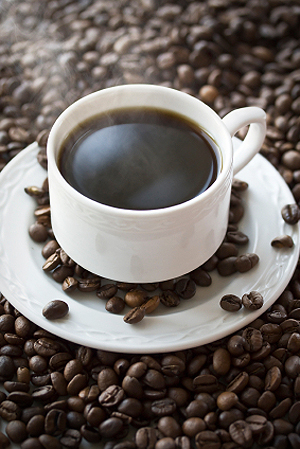
It’s effortless to save the world by drinking organic, Fair Trade coffee. Photography by Ermek | IST. |
| WHAT IT IS: Organic and/or Fair Trade coffee. |
| WHY IT’S DIFFERENT: These are some of the tastier roasts we tried for this article. No milk or sweetener is required to make these coffees divinely drinkable. |
WHY WE LOVE IT: Complex aromas and flavors make these coffees stand out when drunk black. Those who add milk and/or sweetener cover up a lot of great flavor in a great coffee. |
| WHERE TO BUY IT: See individual listings. |
|
|
 |

Organic & Fair Trade Coffee: A Better Cup & A Better World
CAPSULE REPORT: With coffee emporia nearly everywhere you look—cafés and shops that sell beans—you’d think that coffee was a hot growth category. Yet the annual growth rate of conventional coffee between 2000 and 2008 was just 1.5%. Organic coffee imports experienced a 29% annual average growth rate during the same period, and Fair Trade® coffee, 35%. Last year, the amount of organic coffee imported into the United States increased 12%, and Fair Trade coffee increased 30%, despite the worst economy in 70 years and the premium prices that both command.*
You’d think this would be great news, but just 0.6% of the coffee sold in the major consuming countries is organic certified, and even less is Fair Trade certified.†
*Data from North American Organic Coffee Industry Survey: 2009, conducted by the Organic Trade Association. Most sales took place within the U.S.
†Data from the World Bank and SHARE. The 2008 global sales of Fair Trade coffee were 66 metric tons (148 million pounds), slightly less than organic coffee sales in 2006 (67 metric tons).
In honor of National Fair Trade Month, we’ll take a look at some of our favorite organic and Fair Trade coffees. Agricultural products can be organic and Fair Trade, organic or Fair Trade; obviously, the vast majority of foods are neither. What do these terms mean? In brief:
- Organic farming and products help the environment and mankind by refraining from use of chemical pesticides and by conserving the land for wildlife, by soil conservation and reforesting.
- Fair Trade practices and products help the farmers by guaranteeing them fair payment for their crops. This enables them to provide education and medical care for their families, among other basic human needs.
Yet of the $18 billion spent on coffee in the U.S. last year, the tiniest fraction went to organic and Fair Trade coffee.† You can make a difference while enjoying an excellent cup of java. Discover coffee beans sourced and roasted by artisan roasters in the full review below. (Half of our coffees are certified kosher, too.)
|
| |
|
|
THE NIBBLE does not sell the foods we review
or receive fees from manufacturers for recommending them.
Our recommendations are based purely on our opinion, after tasting thousands of products each year, that they represent the best in their respective categories. |
More Fair Trade Products For National Fair Trade Month
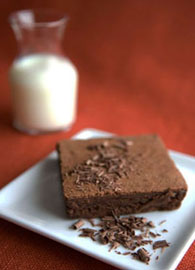 |
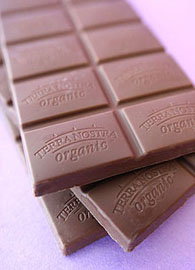 |
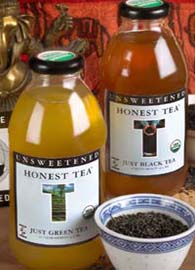 |
| B.T. Brownies. How about a brownie to go with that Fair Trade coffee? You can’t do better than Top Pick of The Week B.T. Brownies, made with Fair Trade ingredients. Read the full review. |
Terra Nostra Chocolate. Organic, Fair Trade and kosher, this socially responsible company also makes vegan milk chocolate and buys energy credits. And they make good chocolate, too! Read our review. |
Honest Tea. In 2003, Honest Tea debuted the first bottled Fair Trade tea in the U.S.(Peach Oo-la-long). Now there are nine types. It’s organic and kosher, too. Read our review of Honest Tea. |
Organic & Fair Trade Coffee: A Better Cup For A Better World
INDEX OF REVIEW
This is Page 1 of a three-page article. Click on the black links to visit other pages.
|
MORE TO DISCOVER
|
What We Tasted
We tasted two dozen organic and Fair Trade coffees for this article. Because Top Pick Of The Week readers tend to like shorter articles rather than tasting notes from dozens of different coffees, we made a severe selection and are presenting coffees with distinctly different styles:
*All of the coffees reviewed are organic & Fair Trade; however, Jim’s does not use Transfair as its Fair Trade certifier, but Utz Certification, which it says on its website has even higher standards than Fair Trade.
There are scores of good organic and Fair Trade coffee roasters, each typically offering more than one single-origin or bean blend. (While we didn’t review any decafs this time around, each of the producers offers them.)
We’ve shown you what we liked best, but get together with coffee-loving friends and try a different bag every week. Share the cost of the coffee or have the others bring the nibbles. It’s a chance to catch up at a regular time and explore the world of fine coffee—as you do your best to save the world, one pound at a time.
|
|
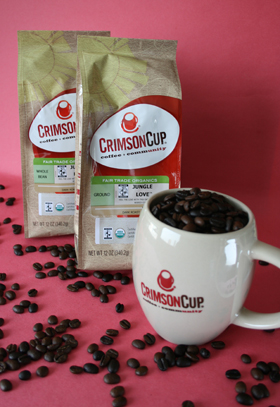
Crimson Cup is both Fair Trade (black and white rectangular logo at left on bottom of bag and below) and organic (green and white logo at right and below). Photo by Hannah Kaminsky | THE NIBBLE
|
Here’s some material to augment your organic and/or Fair Trade coffee klatsch:
Follow us to Page 2 to learn about Fair Trade and organic practices; or jump to Page 3 and start in on the coffee reviews.
—Karen Hochman
Continue To Page 2: Favorite Coffees
Go To The Article Index Above
Do you have friends who would enjoy THE NIBBLE?
Click here to send them an invitation to sign up for their own copy. |
© Copyright 2004-2025 Lifestyle Direct, Inc. All rights
reserved. All information contained herein is subject to change at any time
without notice. All details must be directly confirmed with manufacturers, service
establishments and other third parties. The material in this e-zine may not
be reproduced, distributed, transmitted, cached, or otherwise used, except with
the prior written permission of Lifestyle Direct, Inc.
|
|

|
 |